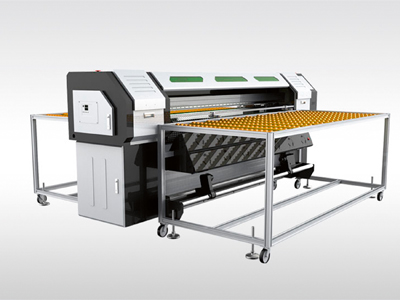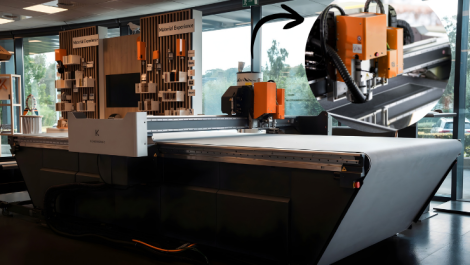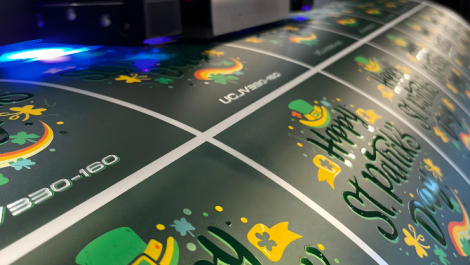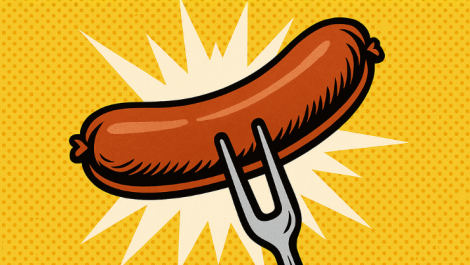The MeiTu R180 UV system can print on rigid and roll media
Repro Sales & Repairs is finding success with a range of Chinese-built wide format machines, with eco solvent, print & cut, UV and textile systems to choose from.
The mention of the words ‘Chinese’ and ‘printing machinery’ consecutively in a sentence is still often enough to raise eyebrows in the Western world, sometimes justifiably. This would not seem to be the case with wide format printer manufacturer MeiTu, however, according to its Essex-based European distributor Repro Sales & Repairs, which has been dealing with China since 1995 as the agent for Founder Electronics’ workflows and RIPs. This is an important point, managing director Nick Field told Digital Printer.
‘I visit China often, so I have been able to find the good machines from the bad. Because of Founder, I have been going to the big trade shows out there one or two times a year. Founder was able to point us in the direction of reputable manufacturers. When we discovered MeiTu, we did the homework and they seem fine.
Twenty-five thousand people work at MeiTu and they just put 10,000 in a new purpose-built factory to produce their eco solvent machines. In China they are the biggest and I’m told that in the US their sales are colossal. I’ve been to the showroom in China and it was seriously impressive – there must have been 150 people having demoes that day.’
He does admit however that some tweaking and tuning is required to the MeiTu printers by Repro Sales before they leave the distributor, which made its name in the CTP and imagesetter market and still operates in that field also.
So, what wide format technology is on offer and why should you buy it? MeiTu itself comes from the textile printing world and although Repro Sales has only just started selling its dye sublimation models, the belt-driven nature of those machines, on which the textile must be prevented from stretching, is an advantage that has also been applied to the more general signage machines, giving them great materials versatility.
Repro Sales began by selling the eco solvent Starjet (in 1.8 and 3.2 metre versions) and CP4000 print & cut systems (prints up to 1300 mm). Next came UV with the MeiTu R180 UV multi-purpose system, which can print on rigid or roll-to-roll materials up to 30 mm thick. There is also a UV flatbed in 2.5 x 1.3 and 1.5 x 1.3 metre versions, and the aforementioned dye sub machines, the MeiTu TeX-320 (3.2 metre) and TeX-180 (1.8 metre).
All in the head
One thing that all of the systems have in common is that they are built around Epson inkjet heads – mostly the DX5, though the Starjet uses DX7 heads. The technology at the heart of the MeiTu printers is therefore proven, and a growing number of UK users are it seems coming to the same conclusion. Mr Field relates a quick anecdote: ‘We had a wide format company come to us that wanted to print serious quality on glass. They came here and we printed on glass with the R180 UV and it was stunning; the guy had never seen anything like it. Another guy wanted a particular white dot. He had tried everything else and then he came and tried this and said “this is exactly what we want”. The machine is so versatile, it does so many things. We think that’s because they use the Epson heads and make their own ink.’
The ink is a key factor in fact in the cost per square metre and the total cost of ownership calculations of the MeiTu systems. Mr Field continued: ‘The cost per square metre is a big win. On the R180 it is less than 50% of other systems. That’s what we push to start with and because we’ve got estimating software on the RIP we can show them the hard figures. It blows their socks off. Printing straight onto Correx and not having to laminate can save them bags of money and time in the first place, and then they see the ink costs too. It is 60p per square metre.
‘We are not trying to reinvent the wheel here; we are trying to reinvent the profit. Today, everyone is nibbling at bits and pieces. We are trying to give people a profit and so far it is working. The way the ink is laid down, it goes twice as far, and then there’s the difference in the ink price too. It’s a price-driven thing. You cannot buy a new UV printer for £35,000 anywhere else that I know of. And then there’s the ink.’
For those minded to look at textiles, the dye sublimation machines also feature integrated drying rollers so that the roll of material is instantly ready for further cutting and sewing.





